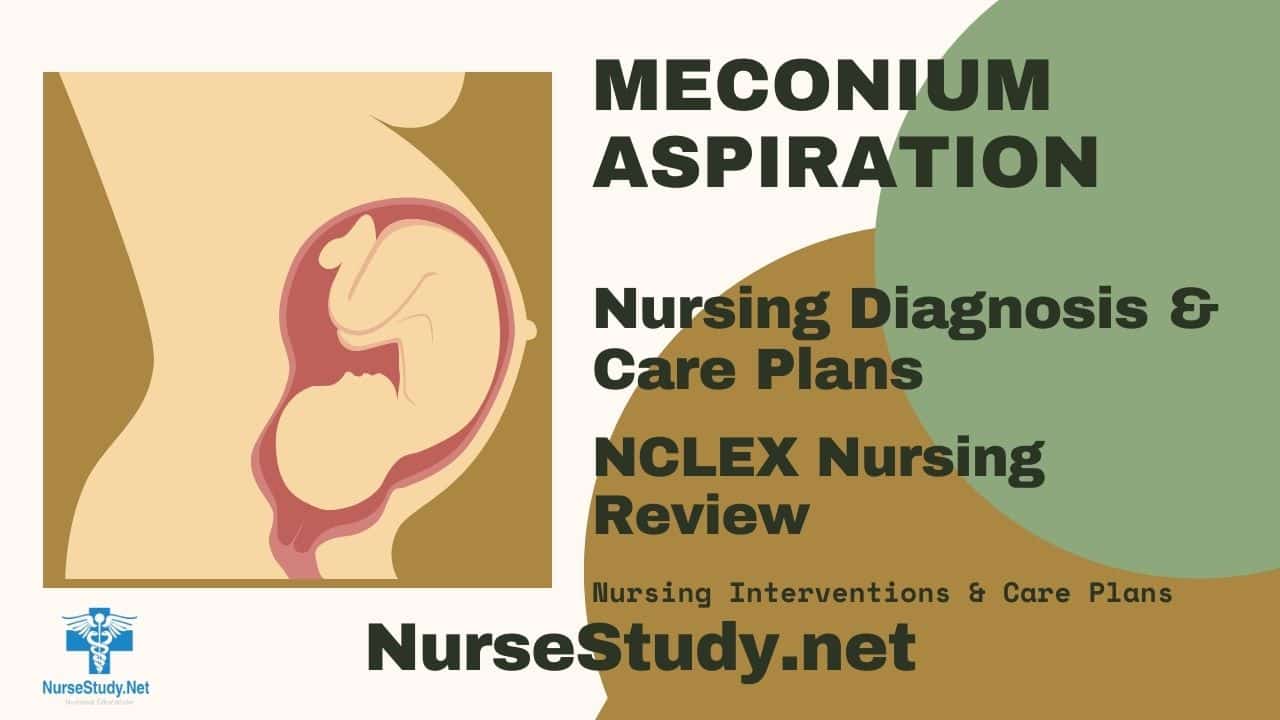Meconium Aspiration Syndrome (MAS) is a serious respiratory condition that occurs when a newborn inhales meconium-stained amniotic fluid into their lungs before, during, or after delivery. This nursing diagnosis focuses on identifying symptoms, preventing complications, and providing appropriate interventions for affected newborns.
Causes (Related to)
Meconium aspiration can occur due to various factors that cause fetal distress:
- Maternal conditions:
- Hypertension
- Diabetes
- Post-term pregnancy
- Preeclampsia
- Fetal conditions:
- Umbilical cord compression
- Placental insufficiency
- Intrauterine growth restriction
- Hypoxia
- Delivery factors:
- Prolonged labor
- Difficult delivery
- Cord prolapse
Signs and Symptoms (As evidenced by)
Subjective: (Observed in infant)
- Respiratory distress
- Grunting
- Nasal flaring
- Cyanosis
- Irritability
- Poor feeding
Objective: (Nurse assesses)
- Meconium-stained amniotic fluid
- Decreased oxygen saturation
- Tachypnea
- Intercostal retractions
- Abnormal chest x-ray findings
- Barrel chest appearance
- Decreased breath sounds
- Elevated CO2 levels
Expected Outcomes
- The infant will maintain adequate oxygenation
- Respiratory rate and effort will normalize
- The infant will demonstrate improved feeding patterns
- Vital signs will stabilize within normal ranges
- No signs of secondary complications
- Achievement of appropriate developmental milestones
Nursing Assessment
Monitor Respiratory Status
- Assess breathing patterns and rate
- Monitor oxygen saturation
- Evaluate breath sounds
- Document retractions and grunting
- Check for cyanosis
Evaluate Cardiovascular Status
- Monitor heart rate and rhythm
- Assess perfusion
- Check capillary refill
- Monitor blood pressure
- Document skin color
Monitor Feeding Patterns
- Assess sucking reflex
- Document feeding tolerance
- Monitor intake and output
- Check for signs of aspiration
- Evaluate weight trends
Check for Complications
- Monitor for pneumonia signs
- Assess for persistent pulmonary hypertension
- Watch for signs of infection
- Check developmental progression
- Monitor neurological status
Nursing Care Plans
Nursing Care Plan 1: Ineffective Breathing Pattern
Nursing Diagnosis Statement:
Ineffective Breathing Pattern related to airway inflammation and obstruction secondary to meconium aspiration as evidenced by tachypnea, retractions, and decreased oxygen saturation.
Related Factors:
- Meconium obstruction
- Airway inflammation
- Chemical pneumonitis
- Increased airway resistance
Nursing Interventions and Rationales:
- Position the infant to optimize breathing
Rationale: Improves lung expansion and ventilation - Suction airway as needed
Rationale: Maintains airway patency - Monitor oxygen therapy response
Rationale: Ensures adequate oxygenation
Desired Outcomes:
- The infant will maintain oxygen saturation >95%
- Respiratory rate will normalize
- Work of breathing will decrease
Nursing Care Plan 2: Risk for Impaired Gas Exchange
Nursing Diagnosis Statement:
Risk for Impaired Gas Exchange related to ventilation-perfusion mismatch secondary to meconium aspiration.
Related Factors:
- Alveolar damage
- Surfactant inactivation
- Airway obstruction
- Pulmonary hypertension
Nursing Interventions and Rationales:
- Monitor blood gases
Rationale: Evaluates ventilation effectiveness - Maintain optimal positioning
Rationale: Promotes optimal gas exchange - Support mechanical ventilation
Rationale: Ensures adequate ventilation
Desired Outcomes:
- Blood gases will remain within normal limits
- Oxygen saturation will remain stable
- No signs of respiratory distress
Nursing Care Plan 3: Risk for Infection
Nursing Diagnosis Statement:
Risk for Infection related to mechanical ventilation and invasive procedures secondary to MAS treatment.
Related Factors:
- Invasive procedures
- Compromised host defenses
- Environmental exposure
- Medical devices
Nursing Interventions and Rationales:
- Maintain sterile technique
Rationale: Prevents nosocomial infections - Monitor for infection signs
Rationale: Enables early intervention - Administer antibiotics as ordered
Rationale: Treats or prevents infection
Desired Outcomes:
- The infant will remain free from infection
- Vital signs will remain stable
- No signs of systemic inflammation
Nursing Care Plan 4: Impaired Oral Feeding
Nursing Diagnosis Statement:
Impaired Oral Feeding related to respiratory distress as evidenced by poor sucking reflex and feeding intolerance.
Related Factors:
- Respiratory distress
- Decreased energy
- Mechanical ventilation
- Altered consciousness
Nursing Interventions and Rationales:
- Assess feeding readiness
Rationale: Ensures safe oral feeding - Coordinate feeding with breathing
Rationale: Prevents aspiration - Monitor nutritional status
Rationale: Ensures adequate nutrition
Desired Outcomes:
- The infant will demonstrate improved feeding patterns
- Weight gain will be appropriate
- No signs of aspiration
Nursing Care Plan 5: Risk for Developmental Delay
Nursing Diagnosis Statement:
Risk for Developmental Delay related to prolonged hospitalization and respiratory compromise.
Related Factors:
- Prolonged hospitalization
- Limited mobility
- Respiratory compromise
- Medical interventions
Nursing Interventions and Rationales:
- Promote developmental care
Rationale: Supports normal development - Encourage parent interaction
Rationale: Promotes bonding and development - Monitor developmental milestones
Rationale: Identifies delays early
Desired Outcomes:
- The infant will meet developmental milestones
- Parent-infant bonding will be enhanced
- Normal growth patterns will be maintained
References
- Bhutani VK, Chima R, Sivieri EM. Innovative neonatal ventilation and meconium aspiration syndrome. Indian J Pediatr. 2003 May;70(5):421-7. doi: 10.1007/BF02723617. PMID: 12841404.
- Chettri S, Bhat BV, Adhisivam B. Current Concepts in the Management of Meconium Aspiration Syndrome. Indian J Pediatr. 2016 Oct;83(10):1125-30. doi: 10.1007/s12098-016-2128-9. Epub 2016 May 21. PMID: 27206687.
- Dini G, Ceccarelli S, Celi F, Semeraro CM, Gorello P, Verrotti A. Meconium aspiration syndrome: from pathophysiology to treatment. Ann Med Surg (Lond). 2024 Feb 15;86(4):2023-2031. doi: 10.1097/MS9.0000000000001835. PMID: 38576961; PMCID: PMC10990371.
- Khatua S, Serrao PR, Milano EL. Advances in management of meconium aspiration syndrome. Indian J Pediatr. 2000 Nov;67(11):837-41. doi: 10.1007/BF02726230. PMID: 11216385.
